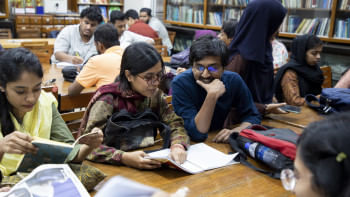How to cope with the loss of a lifelong dream

Most people starting university or their careers are at the precipice of leaving a discipline or profession they once dreamt of, for a more financially rewarding or "practical" and secure job and life. Discarding one's dream of becoming a cricketer, a filmmaker, an artist or an astronaut, only to end up in the rat race – it's a tale old as time.
But where do these people – who have essentially abandoned their dreams for the sake of comfort and often responsibilities – end up in this chaotic mess?
For 27-year-old Mursalin Hossain, the seeds of becoming an aerospace engineer were planted in his mind back in the fifth grade when a group project about the Big Bang gave him the liberty to dive deeper into space. He shared, "Following the release of the movie Interstellar, my interest in Physics and Aerospace was cemented. However, I decided that instead of pursuing a theoretical major, having an Engineering degree would be more practical in getting a job. I enjoyed studying Physics and Astronomy by myself from books and YouTube. Initially, I planned to get a job after undergraduate and master's and then get into teaching after retirement."

However, getting a scholarship in Aerospace Engineering was extremely competitive, and supporting the expense was not an option for Mursalin's family. He added, "If I had decided to pursue that career, soon after completing my undergraduate degree, I would have to get into a master's programme to maintain a competitive advantage since the job market itself is very niche. However, the decision to switch careers wasn't one that I took willingly. I applied to several universities in the US and Canada and even got accepted into some. But even with scholarships, it wasn't financially feasible for my family. As a last-ditch effort, I expanded my applications to more unorthodox countries and more traditional subjects like Business or Computer Science. I got a lucrative offer from a relatively unknown university in Japan with the guarantee of a stable job after graduation, so I took it."
After enrolling in a business course, Mursalin's aspirations and reality were vastly mismatched. "It was difficult finding interest in something after letting go of a 10-year-old dream of what I expected my life to be," said Mursalin. "The mismatch was so dire that I almost dropped out. Over time, I tried breaking down what I liked about my dream career and how much I could incorporate into my current career. This helped me settle down with a career in finance."
Mursalin is now a financial analyst for Amazon in Japan. He still tries to read books and watch videos on Aerospace Engineering and relevant topics to keep his interest alive.
For others, incorporating the two has been a possibility, such as in Anica Hossain's case. Growing up, Anica loved watching animated movies, TV shows, and video games. An early interest in animation sparked her interest in pursuing a career in animation or the gaming industry. She shared, "In 2017, I learned graphic design so that I could do digital illustrations. Right after my A levels, I ended up getting an internship at EMK Centre, where I was working as a graphic designer and got an opportunity to conduct workshops on graphic design."
But when it came to pursuing Visual Arts and Animation as a major, Anica couldn't find enough universities that would offer this major in Bangladesh. "I was honestly devastated that I couldn't study in an art school in Bangladesh and sending me abroad to pursue art wasn't financially feasible for my single mother. So, I ended up enrolling in Media Studies and Journalism at University of Liberal Arts Bangladesh (ULAB)," she said.
However, Anica's major in Communication for Development led to her selection for USAID's Youth and Media Tour in 2022, which made her realise that she wanted to pursue a career in the development sector. "The work I'm doing now requires me to be creative as well. Working with visual communication, I get to do both strategic management and creative communication. So, I was able to blend communication and art to some level."
Azmain Arnob's passion for filmmaking started with shooting small clips and showing them in their colony gatherings, "After buying a Canon camera, my friends and I opened a YouTube channel and started making short films. Our film even won the Best Film Award at the festival arranged by the Children's Film Society."
Arnob initially thought about completing an undergraduate degree in filmmaking. "But pursuing a degree in Media Studies had a certain stigma to it, at least where I grew up," explained Arnob. "And I didn't have access to the necessary information as well. For admission, our choices were binary – either Engineering or Medical Science. I got to know about the film departments at ULAB and Pathshala much later. If I knew about these opportunities earlier, things could've been different."
Arnob completed his undergraduate in Electrical and Electronics Engineering and is currently pursuing a master's degree in the same major. "I chose Engineering from a societal pressure and monetary aspect of things. Back then, I thought that if I wanted to pursue filmmaking, I could do it later without a degree in Media Studies, since the latter doesn't really pay. I also chose Engineering since going abroad is easier with this degree. However, the academic pressure in Engineering doesn't leave much room for artistic expression."
Arnob continues to watch a lot of films to enrich film vocabulary on his own and continues to make amateur films in his free time.
For Mujahidul Islam, a fifth-year medical student, passion in motion graphics started with a Udemy course. He said, "It started as a hobby but soon I was able to monetise it by uploading designs on Fiverr and Envato. I'd get about five to ten USD per design and make around BDT 60,000-70,000 per month. Since there's a lack of skilled labour in the motion graphics industry, I thought of pursuing a career in it."
However, juggling the two wasn't possible for Mujahidul, especially while pursuing an MBBS degree. "When I was working in firms and struggling to balance these parts of my life, I felt like I was at a crossroads and I had to choose. Something had to give and finally, I ended up choosing MBBS since it would be more socially acceptable. Another reason for me switching was the emergence of AI. With AI taking over graphics and media and considering its future scopes, the industry felt very unstable to me," he said.
"STEM subjects aren't really known for accommodating one's creative side," adds Mujahidul. "Academics in the medical field is monotonous, but I enjoy the clinical aspect of it. The thought that I'm helping a sick person become healthy again, reinforces the choice that I made all those years ago."
During our conversations with these people who had left their dreams to pursue stability and steadiness, we noticed what truly embodies this generation – resilience and malleability. These people might have left their passion, but the passion didn't quite abandon them yet.
Even while pursuing a new career path completely unknown to their past selves, they were fighting to incorporate their passion in their careers, juggle the two, or discover new inspirations. The struggle for young people to balance their ambition and reality will help pave the way for future generations to forge one without compromise.
Mehrab Jamee is an activist at Sandhani, a fifth-year student of Mugda Medical College, and writes to keep himself sane. Reach him at [email protected]
Remind Ifti to be quieter at [email protected]

 For all latest news, follow The Daily Star's Google News channel.
For all latest news, follow The Daily Star's Google News channel. 










Comments